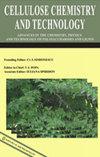DEVELOPMENT OF COMBINED ORGANOSOLV-TEMPO OXIDATION TREATMENT FOR OBTAINING CELLULOSE NANOFIBRES
IF 1.1
4区 农林科学
Q2 MATERIALS SCIENCE, PAPER & WOOD
Cellulose Chemistry and Technology
Pub Date : 2023-02-28
DOI:10.35812/cellulosechemtechnol.2023.57.05
引用次数: 0
Abstract
The aim of this work was to study and optimize the production of nano-size cellulose fibrils (NFC) by combined performic acid treatment, totally chlorine-free (TCF) bleaching and TEMPO-oxidation prior to mechanical treatment. For this purpose, a face-centered design was developed in order to optimize the independent variables governing performic treatment. Under the optimal conditions, a kappa index of 13 was achieved, which decreased to 2.2 after bleaching treatment. These low-lignin pulps were TEMPO-oxidized under different oxidizing conditions, while monitoring cellulose yield, carboxylic acid content and the degree of polymerization. The optimized conditions produced oxidized pulp with 1.4 mmol COOH/g dried nanofibre. Finally, this oxidized cellulose was subjected to high-pressure mechanical processing in order to obtain cellulose nanofibres. From the results, it can be concluded that neither the number of homogenizer passes nor the pressure affected to diameter of fibrils.有机溶剂-TEMPO复合氧化处理制备纤维素纳米纤维的研究进展
研究了在机械处理前,采用高性能酸处理、全无氯漂白和tempo氧化复合工艺制备纳米级纤维素原纤维(NFC)的工艺。为此,开发了以面为中心的设计,以优化控制性能处理的自变量。在最佳条件下,kappa指数为13,漂白后kappa指数降至2.2。在不同的氧化条件下对这些低木质素纸浆进行tempo氧化,同时监测纤维素收率、羧酸含量和聚合度。优化后的工艺条件下,纳米纤维的氧化浆浓度为1.4 mmol COOH/g。最后,对氧化后的纤维素进行高压机械加工,得到纤维素纳米纤维。结果表明,均质机通过次数和压力对原纤维直径均无影响。
本文章由计算机程序翻译,如有差异,请以英文原文为准。
求助全文
约1分钟内获得全文
求助全文
来源期刊

Cellulose Chemistry and Technology
工程技术-材料科学:纸与木材
CiteScore
2.30
自引率
23.10%
发文量
81
审稿时长
7.3 months
期刊介绍:
Cellulose Chemistry and Technology covers the study and exploitation of the industrial applications of carbohydrate polymers in areas such as food, textiles, paper, wood, adhesives, pharmaceuticals, oil field applications and industrial chemistry.
Topics include:
• studies of structure and properties
• biological and industrial development
• analytical methods
• chemical and microbiological modifications
• interactions with other materials
 求助内容:
求助内容: 应助结果提醒方式:
应助结果提醒方式:


